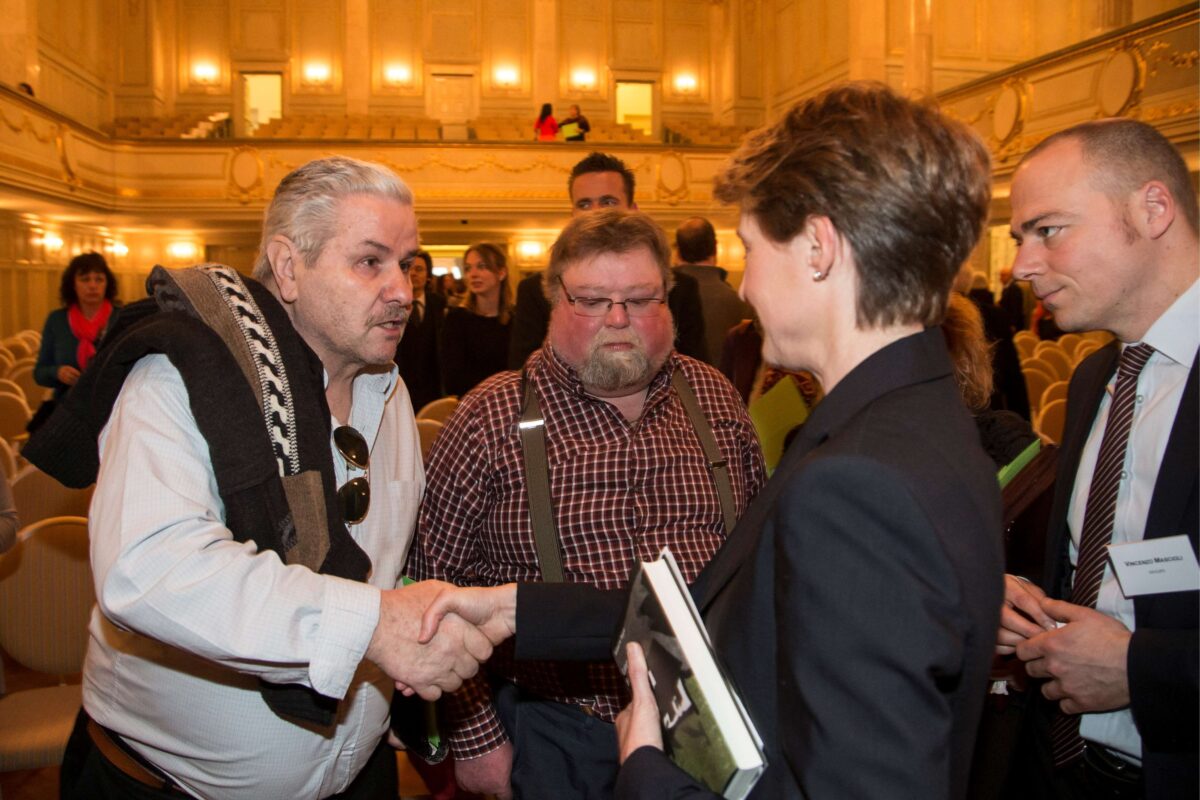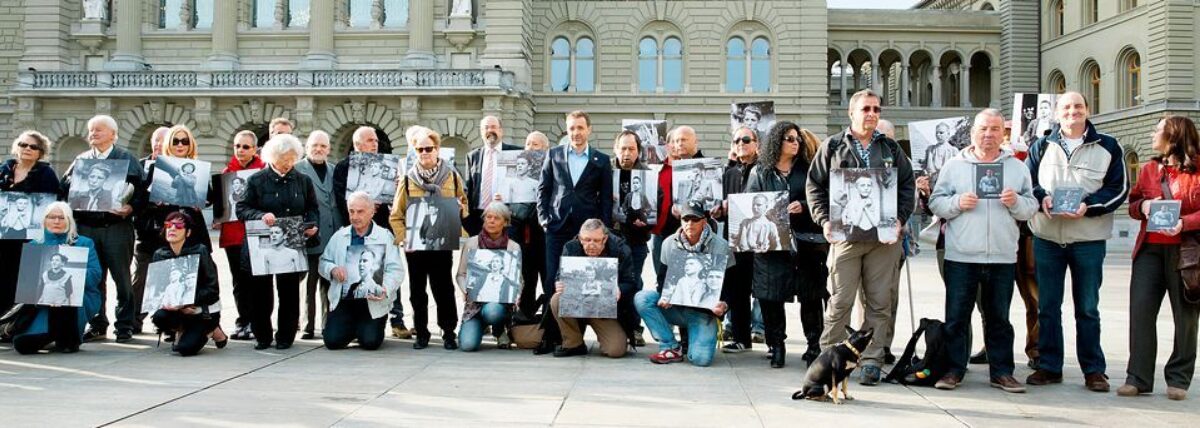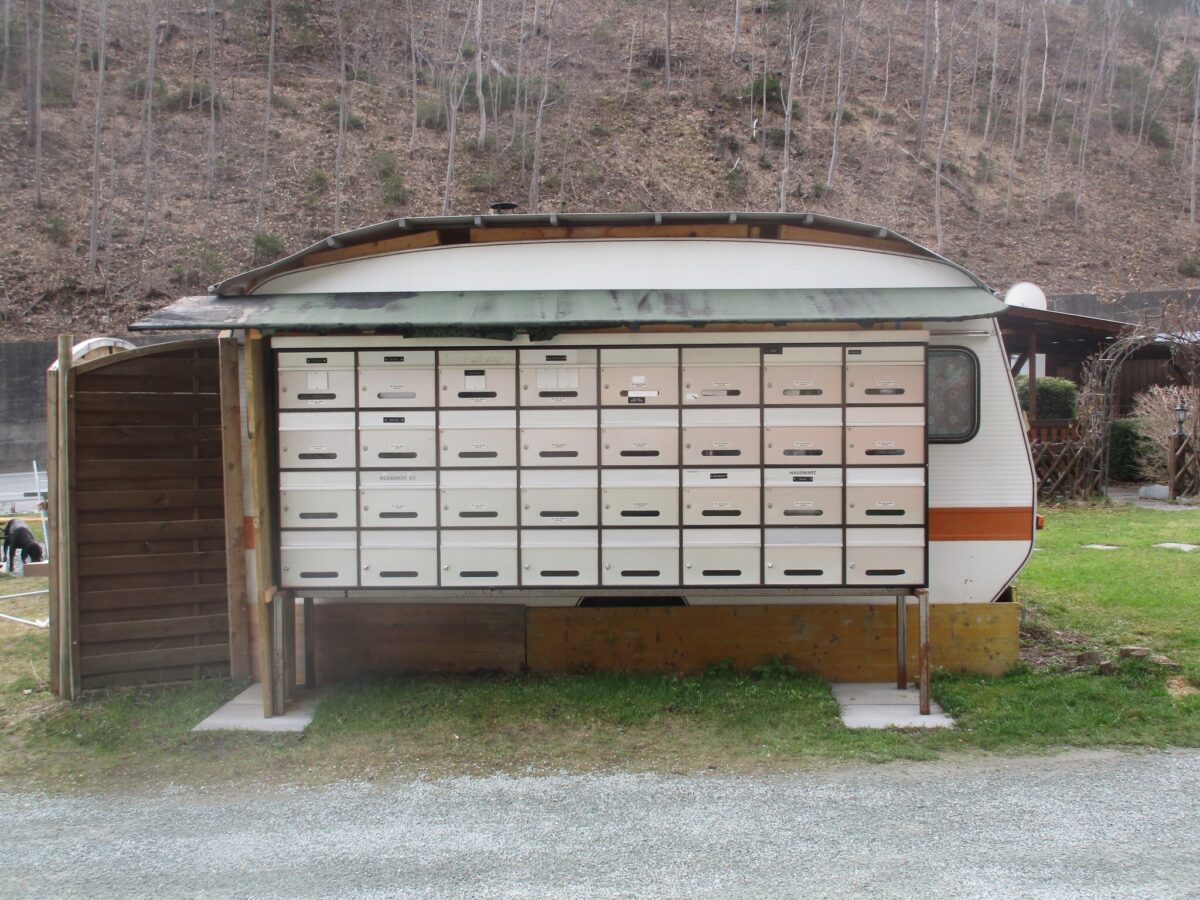Federal reappraisal
The reappraisal of compulsory social measures and placements in Switzerland started in the 1990s. In 1986, a member of the Federal Council asked for forgiveness and offered an apology for the systematic removal of children from Yenish families for the first time, and initiated a process of historical reappraisal. Subsequently, there were a number of procedural requests in the federal parliament concerning various compulsory measures. In 2010, a Federal Councillor issued an apology to people subjected to administrative detention. And in 2013, a national day of commemoration was held in Bern and a round table was initiated to prepare a comprehensive reappraisal. Since 2017, Switzerland has had a legal basis for the reappraisal of compulsory social measures and placements.

Removal of children from Yenish families
Compulsory social measures have been criticised as far back as the beginning of the 20th century. Nevertheless, it was only the economic boom and expansion of the welfare state after the Second World War and the accompanying societal changes that ultimately led to a gradual change of practices and the legal foundations. The media first began to report on the systematic tearing-apart of Yenish families in the early 1970s.
The reporting on Yenish people holding the state accountable created the basis for a public discourse and led to the disbanding of the “Hilfswerk für die Kinder der Landstrasse” in 1973. And after a long and at times bitter struggle, the Yenish also finally gained a hearing in parliament. In 1986, the then President of the Swiss Confederation Alphons Egli asked for apology for the fact that the federal government had co-financed the “Hilfswerk” of the Pro Juventute foundation and thereby caused great suffering. In 1987, Pro Juventute followed suit with an apology of their own. In 1988, a commission on archives and funds was established with the goal of enabling affected Yenish people to access their files. And until 1992, financial compensation of up to CHF 20,000 per person was granted to the victims. The records are held in the Swiss Federal Archives.
Fighting for recognition of injustice and suffering
Other people affected by compulsory social measures and placements continued to struggle to gain recognition of the injustices and pain they had suffered. Some individuals came forward with their devastating life stories and campaigned tirelessly for recognition and reparations. The impetus of affected persons coming together to form organisations and the growing societal awareness of victims’ rights ultimately brought the issues to a turning point. Politicians submitted procedural requests in parliament on the initiative of affected persons. With the support of individuals from the cultural, academic and media spheres, they generated a public debate. There had also already been some academic studies confirming the reports from those affected: it was not a case of tragic individual fates, but rather life-changing interventions that had affected hundreds of thousands of people throughout Switzerland.
The state takes responsibility
Switzerland is not the only country facing up to this dark chapter in its history. The political reappraisal process, however, has proved challenging due to the cantonal and municipal authority over compulsory social measures and placements. The federal government ultimately took responsibility along with the cantons and enabled a national process of rehabilitation and recognition of the injustices to which people from all around the country had been subjected. This reappraisal was made possible due to the decades-long, tireless efforts of those affected, who committed themselves and shared their stories with the public.
At a commemoration ceremony at the Hindelbank women’s penal institution in 2010, Federal Councillor Eveline Widmer-Schlumpf and representatives of the cantons asked for apology. The apology was directed to all people who had been committed by public authorities to penal institutions without a criminal conviction. This ceremony took place 30 years after the cantonal legal basis for administrative detention had been replaced by the new provisions for “detention for the purposes of providing care” in the Civil Code in 1981.
In April 2013, a national commemorative event was held in Bern. Former Federal Councillor Simonetta Sommaruga and delegations from the cantons, national churches and associations asked for an apology on behalf of the approximately 700 affected individuals present for the injustices and suffering inflicted upon them. Among them were people who had been exploited as child labourers on farms or who had been abused in homes and institutions, people who had experienced compulsory measures in psychiatric care, and people who had been forced to give up their children for adoption. This event marked the beginning of a comprehensive national reappraisal. To that purpose, the Federal Councillor initiated a round table for all victims of compulsory social measures and placements. The cantons commissioned victim support services to provide counselling for those affected and the cantonal archives began to help affected persons locate their files.
In September 2013, the federal parliament adopted the Federal Act on the Rehabilitation of Persons Placed in Administrative Detention, which went into force on 1 August 2014. The law included recognition of the injustice and provided the basis for scientific research on administrative detention and established rules for archiving and inspection of files. At the same time, it explicitly ruled out financial compensation for the victims. This was not the final word, however, as further measures were later adopted.
Legal foundation for a comprehensive reappraisal
The above-mentioned round table was tasked with preparing a comprehensive reappraisal, initiating measures and monitoring their implementation. The round table included affected persons and representatives of victims’ organisations as well as representatives of public authorities, institutions and organisations. A fund was set up to provide emergency aid for affected persons in distress. The round table’s report with recommendations for historic, legal, societal reappraisal and financial compensation provided an important basis for the development of the future draft legislation.
The “reparation initiative” launched by Guido Fluri and a broad support committee in 2014 was instrumental in ensuring that the words were followed by action. It called for official recognition of the injustice that was done to the victims, the payment of a solidarity contribution, scientific research and measures to raise awareness and educate the public about the issues. Parliament finally accepted the Federal Council’s counter-proposal, which took into account the core concerns of the initiative, regulated archiving and access of files, and enshrined in law the provision of counselling and support for affected persons and victims. Adoption of the Federal Council’s counter-proposal enabled the reappraisal measures to be implemented much more quickly.

The Federal Act on Compulsory Social Measures and Placements prior to 1981 (CSMPA) went into effect on 1 April 2017. It replaced the previously mentioned Federal Act on the Rehabilitation of Persons Placed in Administrative Detention of 2014. The CSMPA allows victims to apply for a solidarity contribution of CHF 25,000. Victims within the meaning of the law are persons whose physical, mental or sexual integrity or mental development has been directly and seriously impaired by compulsory social measures and placements. The law also regulates access to files for affected persons, scientific research and its dissemination to the general public, and encourages the cantons to create “symbols of remembrance”.
Public awareness of the injustices committed
Initiated by the federal law, cantons and municipalities, as well as organisations and foundations, have also participated in the reappraisal. They established memorial sites as “symbols of remembrance”, commissioned scientific studies and raised public awareness of the injustices committed. Since 2023, the city of Zurich has paid out an additional solidarity contribution for cases in which city authorities or homes were involved. Other municipalities and cantons such as Schaffhausen and Zurich have expressed an intention to follow suit.
On the basis of a legal opinion in accordance with current international law, in February 2025 the Federal Council recognised the systematic measures against the Yenish people as a “crime against humanity”. From today’s perspective, the racially motivated removal of children from Yenish families constitutes a particularly serious violation of human rights. The federal government is currently in consultations with the Yenish and Sinti regarding further steps.

The reappraisal of compulsory social measures and placements is continuing across all levels of government nationwide. Moreover, private, civil society and church organisations and institutions have also begun to examine their own history and have established dialogue with those affected.
